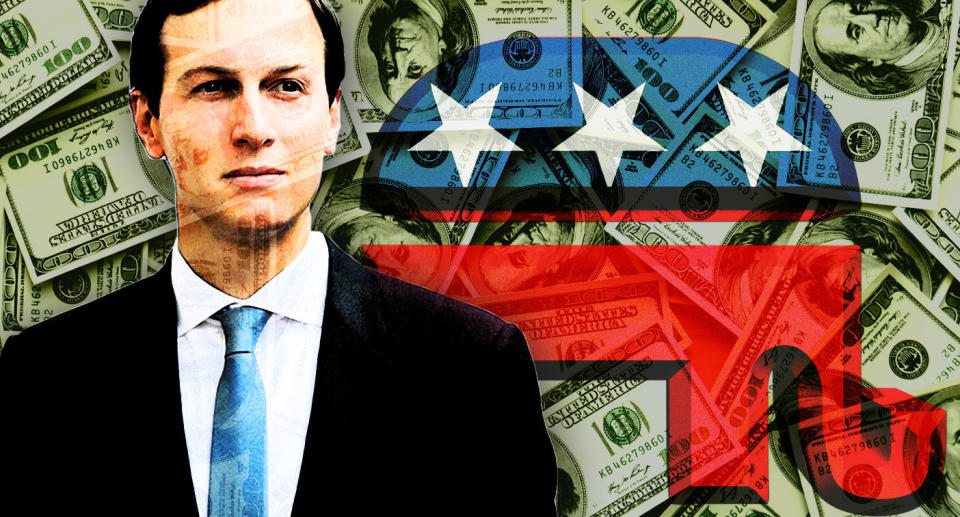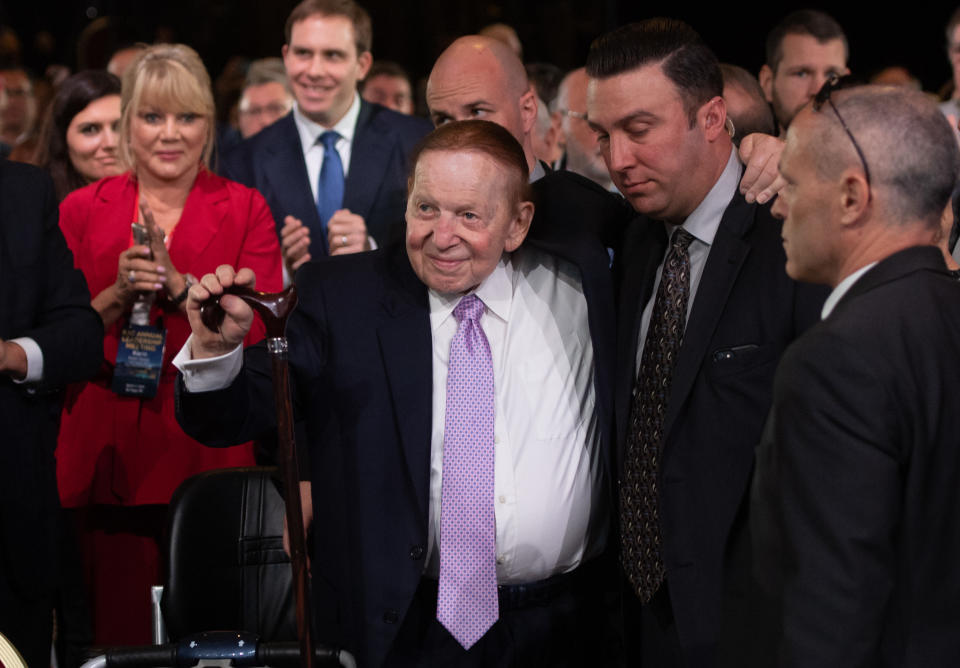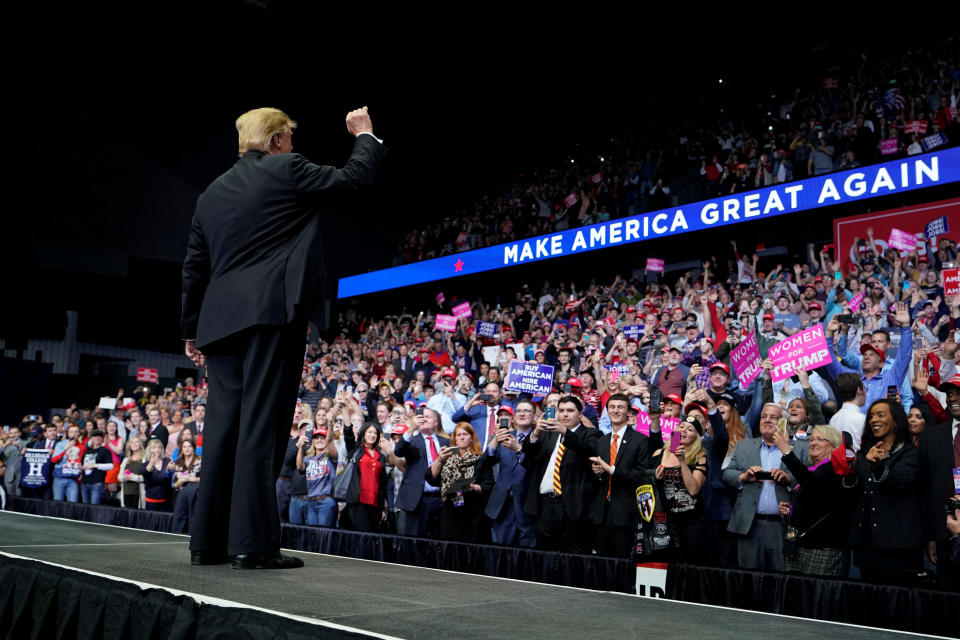'That's robbery': Concerns mount over Jared Kushner's role in GOP money machine
- Oops!Something went wrong.Please try again later.
- Oops!Something went wrong.Please try again later.
WASHINGTON — Jared Kushner got the GOP’s small-dollar money machine finally moving, but in a twist befitting of the insular world of Republican campaign consultants, Trump’s influential son-in-law is also now being cited as a stumbling block for the critical effort.
WINRED is the proposed small-dollar “payment processor” that the Republican National Committee and the campaign of President Trump hope to spread across the universe of Republican campaigns to generate enough money to keep up with the Democrats’ wildly successful small-dollar fundraising machine, ActBlue.
The idea had been floated for years among Republican consultants, but often ran up against a web of competing interests and the same concerns that have stalled it now — namely, who gets the profits. But after 2018’s drubbing in the midterms, GOP megadonor Sheldon Adelson threw down the gauntlet — no more donations from him until the GOP builds a matching version of ActBlue.

Trump tasked Kushner with the job, according to Republicans familiar with the effort who spoke on condition of anonymity for fear of reprisal from the White House.
“Nobody else had the authority to put it together,” said a Republican familiar with the effort. “Adelson was not happy with the way the money was being spent and raised. The president did look to Jared — basically them knowing that Jared was doing it, everyone coalesced around WINRED.”
The stakes are high for Trump’s reelection effort and the broader Republican Party as they head into the 2020 campaign. The Trump campaign recently posted $30 million in donations over the first three months of 2019, well ahead of even the most powerful Democratic fundraising machines (Bernie Sanders raised $18.2 million in the first six weeks of his candidacy). And Lara Trump, Trump’s daughter-in-law, said recently on “Fox and Friends” that the campaign expects to spend $1 billion on the reelection effort.

Yet the fundraising playing field has tilted for 2020 away from megadonors like Adelson and others to the power of “small donors” — broad-based fundraising, typically under $100 per donation. The Democrats flexed that power in a big way in 2018, collecting more than $700 million via ActBlue. As donors and campaign operatives watched Democrats rack up big fundraising tallies in House and Senate races, they became increasingly worried about their own ability to tap into “small-dollar” donors.
Officials with the Republican National Committee, the National Republican Senatorial Committee (working for the Senate GOP) and the National Republican Congressional Committee (working for the House GOP) have spun their wheels for years, said two veteran Republicans.
But 2018’s bloodbath helped kick them into gear. One GOP consultant recalled watching a Democrat running in conservative Kentucky, Amy McGrath, raise more than $3 million in just three months against incumbent Republican Rep. Andy Barr.
Shortly before the election, Senate Majority Leader Mitch McConnell tasked his top political aide, Josh Holmes, with trying to come up with a GOP version of ActBlue. After the election, Adelson sent his ultimatum to Trump, who handed it off to Kushner.

The WINRED machine represents the merger of the GOP’s valuable collection of voter data, the Data Trust, and Revv, an online payment processor run using Stripe. From the start, Revv had a leg up because Trump uses it for his online fundraising. But other consultants urged the WINRED team to adopt a more widely used platform called Anedot, which they argued would be easier and cheaper.
“The party has been losing the small-dollar race for years,” said one veteran Republican. “There’s always a conflict between the established folks. In the fundraising business, there’s probably four or five companies who do this. So if you pick one and say, ‘You’re it,’ by definition you screw the other three or four.”
The weight of the White House and president’s reelection campaign finally gave the parties enough juice to convince important players that this was the year it was going to happen and they could either get on board or be left in the dust.
The Kushner twist is ironic, noted one GOP veteran, because it was Kushner’s involvement that was needed to actually get the project moving to begin with. The group building WINRED publicly announced the product in January in a Politico article. But concerns raised by veteran GOP operatives about who would profit from the effort have stalled its rollout since then.
“I can understand why the establishment might be nervous — the president has gotten here without their help, and will continue to succeed without their help,” said one Republican supporting the WINRED effort.
But GOP consultants left in the dust smelled something different, they spied a rush to cash in on a lucrative new market for the GOP — small-dollar fundraising. Whoever won the WINRED contract was likely to earn a hefty profit for the foreseeable future.
WINRED, like ActBlue, works like a credit card company — making its money by collecting a marginal fee on every transaction. It might not seem like much on a single donation, but multiply it by tens of thousands of donations every cycle, and all of a sudden it translates into serious business.
WINRED would collect 4 percent on every donation — so a $100 donation to Trump would net $4 for WINRED and $96 for Trump — and then send the money to the campaign via a “conduit PAC,” according to one Republican familiar with the effort.

The profits and expenses for campaigns are so large at that margin that the campaigns and consultants will literally haggle over .01 percent. They have a term for it: basis points. So the 4 percent WINRED fee would be 400 basis points. ActBlue charges its candidates 3.95 percent per transaction, or 395 basis points, according to its site.
It may sound small, but veteran campaign operatives said that a serious presidential campaign, like Trump’s reelection bid, should be using its size and power to negotiate that fee down significantly — and spending more of the money on what donors intended, not helping consultants.
“That’s robbery,” former Trump campaign adviser Barry Bennett said of the 4 percent charge. “That’s outrageous.”
Among concerns cited by some Republican consultants contacted by Yahoo News, was that Jared Kushner’s younger brother, would benefit via his investment in the technology company underlying WINRED, Stripe. Kushner's firm, Thrive Capital, invested $30 million in Stripe in 2014 and made a second investment in Stripe, for an unstated amount, in September 2018.
But other GOP consultants pointed out that Josh Kushner is unlikely to benefit from the move, because Stripe already processes payments for online giants like Amazon and Google. Added to that, the value of Josh Kushner’s stake in Stripe wouldn’t be big enough to be significantly affected by the addition of WINRED.
A Republican familiar with Jared Kushner’s efforts on the project said that he stands to make no money himself and that he didn’t now about his brother’s holdings in Stripe until a Yahoo News reporter asked about it.
“Revv’s decision to partner with Stripe was made years ago, and given Stripe’s work with massive clients like Amazon, Google, and Microsoft, the benefit to the company’s bottom line will minimal," said Trump campaign press secretary Kayleigh McEnany in a statement to Yahoo News. "The negotiated fee includes all underlying fees and the ‘swiping fee’ charged by Stripe. WINRED will increase low-dollar fundraising for President Trump’s re-election effort, as well as for all Republican candidates, and we believe it will exceed ActBlue’s effectiveness for Democrats.”
On the flip side, the profit for the consultants who end up owning pieces of WINRED could be quite lucrative, depending on how the contract is negotiated. And that is precisely one of the sticking points being hammered out on contract talks, said Republicans familiar with the effort. One Republican said they were close to finishing and could have an agreement within a week or two. Another Republican familiar with the effort said it would be ready for U.S. House and Senate candidates by either the end of this week or the start of the next.
Negotiations between lawyers for the RNC’s Data Trust and Revv have centered recently on who will control seats on the board overseeing WINRED and what cut of the profits the consultants behind Revv and WINRED will get.
The delays could extend longer in some cases. Revv founder and former RNC digital director Gerrit Lansing told a group of state-level Republicans in February that he didn’t think the fundraising machine would be fully available for use by state-level candidates until June 2020, deep into the election, according to Republicans who heard his remarks.
“The Trump campaign, quite rightly, only cares about themselves,” said one GOP consultant. “They’re not long players in this, there has to be somebody focused on the long term.”
Tom LoBianco is a political reporter based in Washington and author of the forthcoming biography of Vice President Mike Pence “Piety & Power: Mike Pence and the Taking of the White House” due out in September. Find him on Twitter or LinkedIn.
Updated [8:24 pm, April 22, 2019]: This story has been updated to include a statement from the Trump campaign, and to clarify the amount of investment Josh Kushner's firm, Thrive Capital, has in Stripe.
_____
Read more from Yahoo News:
AOC: Trump is 'absolutely' trying to incite violence against Omar
Trump confirms possible plan to send immigrants to sanctuary cities
Bernie Sanders supports letting jailed felons vote in elections
Buttigieg suggests Pence offered him empty praise when he came out
AOC on ‘Game of Thrones’ finale: It’d be ‘badass’ if it ended in democracy


